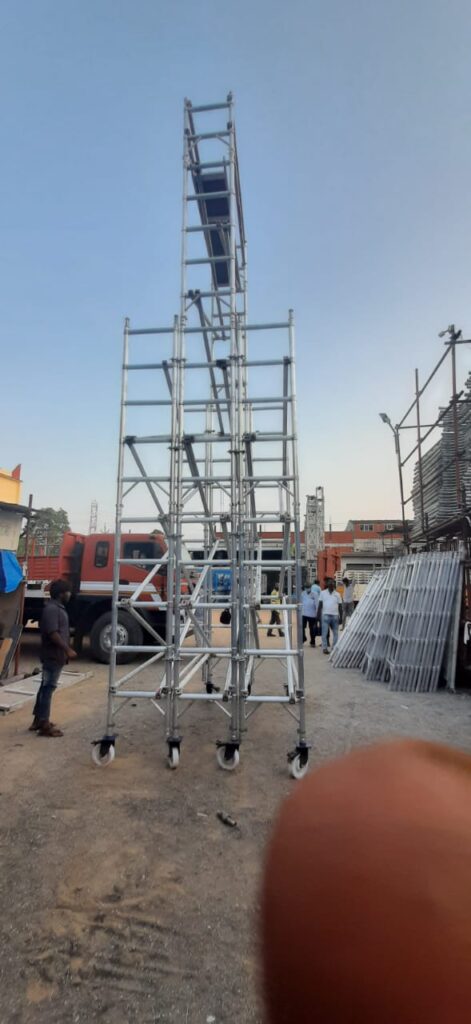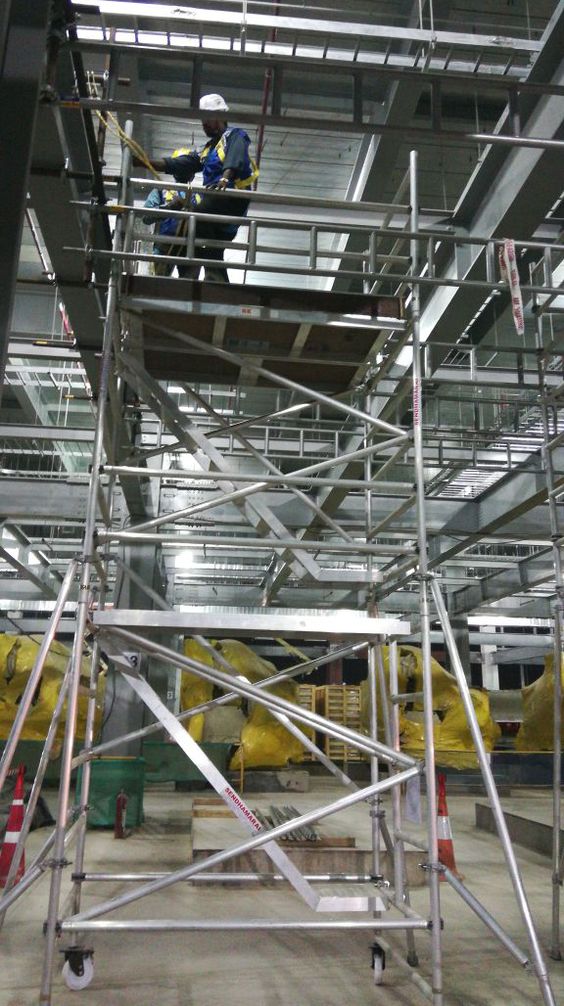Table of Contents
In the fast-evolving construction industry, the choice of materials can make a significant difference in project outcomes. One material that is gaining widespread recognition is aluminium scaffolding. Particularly in scaffolding, aluminium is revolutionizing the way construction projects are approach
The Rise of Aluminium Scaffolding Material in Construction
Aluminium has emerged as a preferred material in various construction applications due to its unique properties. Unlike traditional materials like steel or wood, aluminium offers a perfect blend of strength and lightness, making it ideal for scaffolding structures.
1.1 Lightweight and Easy to Handle
One of the most compelling advantages of aluminium scaffolding material is its lightweight nature. Traditional scaffolding materials, such as steel, are heavy and require more manpower and time to assemble. Aluminium, on the other hand, is significantly lighter, which simplifies the assembly process. This not only reduces labor costs but also minimizes the physical strain on workers, leading to a safer and more efficient work environment.
1.2 Durability That Stands the Test of Time
Despite its lightweight nature, aluminium is incredibly durable. It resists corrosion and can withstand harsh environmental conditions, making it suitable for both indoor and outdoor projects. Aluminium scaffolding does not rust, unlike steel, which means it maintains its structural integrity over time. This durability translates into a longer lifespan for scaffolding systems, providing excellent value for money.
1.3 Easy to Use and Versatile
Aluminium scaffolding is also known for its ease of use. Its modular design allows for quick and straightforward assembly and disassembly, which is crucial in fast-paced construction environments. Moreover, aluminium scaffolding systems are highly versatile, easily adaptable to various heights and configurations, making them suitable for a wide range of construction projects.

2. The Economic Benefits of Aluminium Scaffolding material
Switching to aluminium scaffolding material can lead to significant cost savings over the life cycle of a construction project. Here’s how:
2.1 Reduced Labor Costs
As mentioned earlier, the lightweight nature of aluminium scaffolding reduces the physical effort required to set up scaffolding. This, in turn, reduces the number of workers needed and the time spent on installation, leading to lower labor costs.
2.2 Lower Transportation Costs
The reduced weight of aluminium scaffolding material also translates to lower transportation costs. More scaffolding units can be transported in a single trip, reducing fuel consumption and overall transportation expenses.
2.3 Long-Term Investment
Although the initial cost of aluminium scaffolding material might be higher than other materials, its durability ensures a longer lifespan. This makes it a smart long-term investment, as it requires fewer replacements and less maintenance over time.
3. Aluminium Scaffolding and Safety
Safety is a paramount concern in construction, and aluminium scaffolding contributes to a safer work environment in several ways:
3.1 Enhanced Stability
Aluminium scaffolding is designed with stability in mind. Its modular components are engineered to fit securely together, reducing the risk of accidents due to instability. Additionally, the non-slip surfaces on aluminium platforms further enhance worker safety.
3.2 Lightweight Yet Strong
While being lightweight, aluminium scaffolding material does not compromise on strength. It can support heavy loads, ensuring that workers can carry out their tasks without fear of structural failure. This balance between weight and strength is crucial in maintaining a safe working environment.
3.3 Resistance to Environmental Factors
Aluminium’s resistance to rust and corrosion ensures that scaffolding remains safe to use even in harsh weather conditions. Unlike steel, which can weaken over time due to rust, aluminium retains its strength, thereby reducing the risk of accidents.

4. The Future of Construction with Aluminium Scaffolding
As the construction industry continues to evolve, the demand for materials that are not only strong and durable but also lightweight and easy to use will grow. Aluminium scaffolding fits perfectly into this future vision. Its benefits go beyond just being a construction material; it represents a shift towards more efficient, safer, and sustainable building practices.
4.1 Adoption Across the Industry
More construction companies are recognizing the advantages of aluminium scaffolding material and are making the switch. As adoption increases, it’s likely that aluminium scaffolding price will become the standard in the industry, replacing heavier and less efficient materials.
4.2 Innovation and Development
The future of aluminium mobile scaffolding material will likely see further innovations, such as enhanced modular designs and even lighter yet stronger alloys. These developments will continue to push the boundaries of what is possible in construction, making projects faster, safer, and more cost-effective.
Aluminium scaffolding rental is poised to become the future of construction due to its lightweight, durable, and easy-to-use nature. It offers numerous advantages over traditional materials, including cost savings, enhanced safety, and environmental sustainability. As the industry continues to advance, aluminium scaffolding will undoubtedly play a key role in shaping the construction landscape.